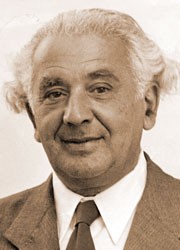Fritz Feigl facts for kids
Quick facts for kids
Fritz Feigl
|
|
|---|---|
 |
|
| Born | 15 May 1891 |
| Died | 23 January 1971 (aged 79) |
| Nationality | Austrian until 1944 Brazilian |
| Alma mater | University of Vienna |
| Known for | Luminol Spot analysis |
| Awards | Wilhelm Exner Medal (1957) Fritz Pregl Prize (1931) Weizmann Prize (1951) |
| Scientific career | |
| Doctoral advisor | Wilhelm Schlenk |
| Doctoral students | Erwin Chargaff Cláudio Costa Neto |
Fritz Feigl (born May 15, 1891 – died January 23, 1971) was a brilliant chemist. He was born in Austria and later became a citizen of Brazil. He taught at the Federal University of Rio de Janeiro. Feigl is famous for inventing "spot analysis," a super simple way to test chemicals, and for helping develop "luminol," which helps police find clues.
Contents
About Fritz Feigl
Fritz Feigl was born in Vienna, Austria. He started studying there, but his studies were paused because he had to serve in the First World War. This was a huge global conflict that happened from 1914 to 1918. After the war, he finished his Ph.D. in 1920. He became a professor at the University of Vienna in 1928.
However, things changed for Feigl in 1938. At that time, Austria was taken over by the Nazis. Because Feigl was Jewish, he was forced to leave his job. He managed to escape to Belgium and continued his work there. But when Belgium was also occupied, he was put in a camp where people were held against their will. Luckily, Feigl was able to get out and travel to Portugal, and from there, he reached Brazil in 1940.
In Brazil, he found a new home and continued his important work. He worked at the University of Rio de Janeiro and became a Brazilian citizen in 1944.
Amazing Discoveries and Inventions
Fritz Feigl is best known for creating something called "spot analysis" or "spot tests." This is a very simple and effective way to test chemicals. You only need one or a few drops of a chemical solution. Often, you do this test on a piece of filter paper, and you don't need any fancy equipment.
One great example he created was a simple test to check if fish eaten by people in the Amazon were contaminated with lead. People living near the Amazon rivers, who might not have had much money, learned to use this easy technique. They could find out if their fish were safe to eat and avoid those that were contaminated.
In 1962, when Feigl turned 70, the Chemical Society of Midland held a special meeting. About 500 scientists from 24 countries attended. All the main talks at this meeting were about spot tests, showing how important his work was.
Another important invention by Feigl is "luminol." This substance is used by forensic investigators, like those who solve crimes. Luminol helps them find traces of blood, even if someone has tried to wash and clean the crime scene. It makes the blood glow in the dark, revealing hidden clues.
Books by Fritz Feigl
Fritz Feigl wrote several important books about his chemical discoveries:
- Qualitative Analyse mit Hilfe von Tüpfelreaktionen, 1931
- Chemistry of specific, selective and sensitive reactions, 1949
- Spot tests in inorganic analysis, 1958
- Spot tests in organic analysis, 1966
Awards and Honors
Fritz Feigl received many awards for his amazing contributions to chemistry:
- 1931: Fritz Pregl Prize
- 1951: Weizmann Prize for Research in the Exact Sciences
- 1956: Honorary doctorate from the University of São Paulo
- 1957: Wilhelm Exner Medal
- 1961: Austrian Cross of Honour for Science and Art
Prizes Named After Fritz Feigl
To honor his important work, two prizes are named after Fritz Feigl:
- The Fritz Feigl Prize is given by the Austrian Society of Analytical Chemistry (ASAC) since 1950.
- In Brazil, the Fritz-Feigl Prize (Prêmio Fritz Feigl) has been awarded since 1996 by the CRQ-IV (4th Regional Chemical Association). This prize rewards and encourages chemists. Winners receive a certificate, a medal, and money. For example, in 2005, the prize was 12,000 euros.
 | Laphonza Butler |
 | Daisy Bates |
 | Elizabeth Piper Ensley |

